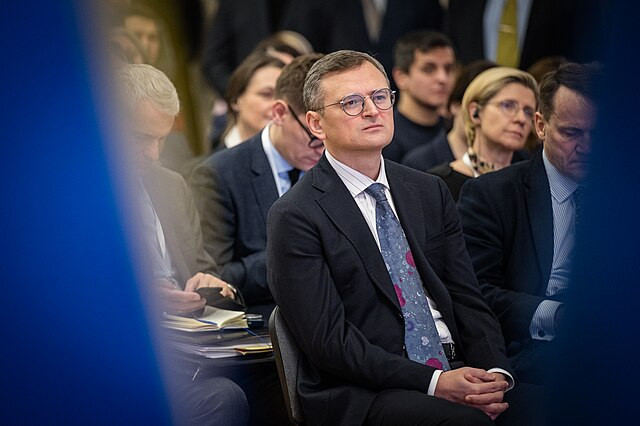Ukraine's Foreign Minister Dmytro Kuleba has tendered his resignation ahead of a sweeping government reshuffle, as Russian missiles struck the city of Lviv, resulting in at least seven deaths. The resignation of Kuleba, a central figure in Ukraine's diplomatic efforts, comes as President Volodymyr Zelensky prepares to realign his administration during a critical period in the ongoing conflict with Russia.
Kuleba's resignation was announced on Wednesday, a day marked by renewed violence as Russian forces launched a barrage of missiles at Ukrainian cities. The attack on Lviv, a city previously considered relatively safe from the front lines of the war, claimed the lives of seven individuals, including a 14-year-old girl. Ukrainian officials have reported that 25 people were injured, with several in critical condition. The strike in Lviv follows a recent deadly attack in Poltava, where two ballistic missiles hit a military academy and a hospital, killing over 50 people and injuring more than 200.
President Zelensky's administration is in the midst of a significant overhaul, with more than half of the Cabinet expected to be replaced. This reshuffle comes at a time of intensified Russian aggression and as Ukraine's military faces increasing pressure, particularly around the strategically important city of Pokrovsk. The reshuffle is likely intended to rejuvenate the government as Zelensky prepares for high-profile international engagements, including an upcoming visit to the United States for the United Nations General Assembly.
The Ukrainian parliament, which must approve these changes, has already acted on several resignations. Among those who have stepped down are the Ministers for Strategic Industries, Justice, Environment, and Reintegration. While the resignation of Kuleba is still pending approval, the parliament has accepted the resignations of three other ministers and one vice premier. The reasons behind Kuleba's resignation have not been publicly clarified, but political analysts suggest it is part of a broader strategy to inject new energy into the government.
Kuleba has been a prominent figure on the international stage, advocating for Ukraine's needs and securing support from foreign allies. His resignation may be part of Zelensky's effort to refresh his team as the war drags on and as Ukraine's international relationships continue to evolve. "The fall will be extremely important for Ukraine," Zelensky stated in a recent address, emphasizing the need for an efficient and dynamic administration.
In a conversation with CNN's Christiane Amanpour, Kuleba predicted that Russian President Vladimir Putin would continue his aggressive strategy, targeting Ukraine's infrastructure and economy. "Putin still has the same purpose to freeze people, to destroy our economy," Kuleba said, stressing the urgent need for enhanced air defense systems.
The intensity of the conflict has escalated, with recent strikes not only targeting military facilities but also civilian areas and infrastructure. The attack on Lviv's historic district, which damaged several UNESCO-protected sites, highlights the growing threat to civilian life and cultural heritage amid the ongoing war.
In response to the escalating violence, Zelensky has called on Ukraine's allies to provide more advanced weaponry and to relax restrictions on targeting Russian positions. The relentless Russian bombardment, including attacks on energy infrastructure, has caused widespread power outages and suffering for millions of Ukrainians.
Meanwhile, the situation at the Zaporizhzhia nuclear power plant remains precarious. The International Atomic Energy Agency (IAEA) Chief Rafael Grossi warned of a "very fragile" situation following damage to one of the plant's power supply lines due to recent Russian strikes. The potential for a blackout at the plant could have dire consequences, including the risk of a nuclear disaster.




